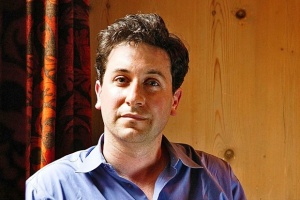Ken Dornstein
(author, film producer) | |
|---|---|
 | |
| Born | 1969 USA |
| Relatives | David Dornstein (Lockerbie victim) |
Ken Dornstein is a television editor, television producer and an author. He lives with wife and two children near Boston, Massachusetts where he works for US Public Broadcasting Service (PBS) television.[1]
Ken Dornstein's elder brother David was killed on 21 December 1988 when Pan Am Flight 103 exploded over Lockerbie in Scotland. In 2006, he wrote a book about the Lockerbie bombing entitled "The Boy Who Fell Out of the Sky"[2] and in September 2015 produced the PBS Frontline film "My Brother's Bomber".[3]
Contents
"Getting away with murder"
When Abdelbaset al-Megrahi was granted compassionate release from prison in Scotland in August 2009 film producer Ken Dornstein "couldn’t suppress the feeling that Megrahi was literally getting away with murder." Dornstein suspected that other perpetrators remained at large in Libya. To assist Dornstein's investigation, former SIO Stuart Henderson gave him a list of Megrahi's eight “unindicted co-conspirators” who had never been put on trial.[4]
The Libya Dossier
First on Henderson's list was Abdullah Senussi, brother-in-law of Muammar Gaddafi. The remaining seven were:
- Nasser Ali Ashour, the Armourer. A "smooth, cultured" spy who supplied Semtex and guns to the Provisional IRA for Gaddafi in the 1980s. Adrian Hopkins, the Irish skipper who helped smuggle the arms, told French police: "He spoke English with a very distinguished accent. He never looked you in the face, likes to parade, has small feet, wears Italian shoes, drinks whisky but does not smoke." He managed Libya's network of agents in the Mediterranean and hunted down Libyan dissidents throughout Europe. Now aged 68, his whereabouts are unknown.
- Mohammed Abouagela Masud (aka Abu Agila Mas’ud), the Technician. Introduced to a CIA undercover agent as an airline technician, he worked with Megrahi and Fhimah in Malta where the bomb was allegedly planted on a feeder flight in an unaccompanied Samsonite suitcase. The evidence against Mas'ud is thought to have been the subject of secret court hearings held behind closed doors in Valletta in 2012, at the request of the Crown Office. His whereabouts are unknown.
- Said Rashid, the Assassin. A former head of JSO's operations section and close friend of Gaddafi who went on to become a powerful government figure. He was killed in a shoot-out with rebels in February 2011 following a speech by the dictator's son, Saif. In 1983, Rashid was arrested in France in connection with the murders of Libyan dissidents in London, Bonn and Rome, but later released.
- Ezzadin Hinshiri, the Diplomat. Another senior JSO figure who became a top official and one of Gaddafi's most loyal lieutenants. He was killed along with 52 other regime supporters in an infamous massacre at a seafront hotel in Sirte in the final days of the uprising in April 2011.
- Badri Hussan, the Businessman. Set up a front company with Megrahi and rented an office in Zurich from Mebo, the Swiss firm linked to the timers used in the bombing. The firm's co-founder, Edwin Bollier, told the Lockerbie trial that he delivered a suitcase from Hussan to Hinshiri in Tripoli on December 17, 1988 - just days before the terror strike. Whereabouts unknown.
- Mohamed Marzouk and Mansour Omran Saber, the Missing Links. Arrested at Dakar airport in Senegal in February 1988 with Semtex, TNT and bomb triggers. They were released without charge. In 1991, a "brilliant, young" CIA analyst realised the triggers matched those used in the Lockerbie bombing, changing the entire course of the investigation. Whereabouts unknown.[5]
Henderson told Dornstein that if he could get to Libya it might be possible to track down the men who could then be brought to trial. Over the course of three trips to Libya starting in 2011, Dornstein sought out the eight men on the list, finally revealing that Abu Agila Mas’ud was his main suspect.[6]
Smokescreen
On 4 October 2015, in a review of Dornstein's film in the Sunday Herald, John Ashton wrote:
- Now it (the prosecution’s Lockerbie narrative) has been breathed new life into by a three-part documentary for the US Public Broadcasting Service’s Frontline series. Trailed by a lengthy article in the New Yorker, the film suggests that Megrahi was, after all, involved in the bombing as an accomplice to a man called Abu Agila Mas’ud. I was a paid consultant during the early stages of the film’s production, but I disagree with its conclusions.[7]
- The fear is that the Frontline film’s claims will provide the Crown Office with a smokescreen, from behind which it can brief that Megrahi was guilty all along and that its failures were therefore immaterial. They were anything but and, until it is held to account for them, they will remain a terrible stain on Scottish justice.[8]
Related Document
| Title | Type | Publication date | Author(s) | Description |
|---|---|---|---|---|
| Document:Call for US to give update on fourth Lockerbie suspect | Article | 18 December 2022 | Kathleen Nutt | Former Justice Secretary Kenny MacAskill: "Britain and America know everything. I want the UK and US to be more open. Libya have offered up Abu Agila Masud. But Masud is smaller beer. The Lord Advocate should find out what progress is being made on bringing Abdullah Senussi to court." |
References
- ↑ "Ken Dornstein IMDb"
- ↑ "A Brother's Journey for the Truth About Lockerbie"
- ↑ “'My Brother’s Bomber': The compelling personal crusade to crack the terror plot behind the 1988 Lockerbie explosion"
- ↑ "The Avenger"
- ↑ "Lockerbie: Seven new Libyans named"
- ↑ "My Brother's Bomber: The Libya Dossier"
- ↑ "Linking Megrahi to a new Lockerbie bombing suspect won't work ... he was innocent and his conviction is a stain on Scottish justice"
- ↑ "Response to PBS Frontline ‘My Brother’s Bomber’"